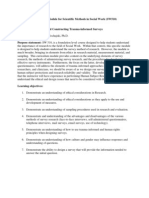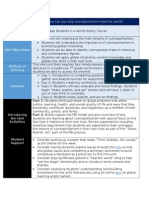0 ratings0% found this document useful (0 votes)
138 viewsBiology 30 Case Study Project Report
Biology 30 Case Study Project Report
Uploaded by
ChaitaneyMorStudents in Biology 30 will complete a case study project on various topics within the curriculum. They will present their case studies at an exhibition at the end of the course. The project aims to teach students the Biology 30 program of studies, proper research techniques, data analysis and interpretation skills. Students will receive a timeline and undergo a process of individual proposals, peer review, teacher review, and revisions before their final presentations. Their work will be assessed using a rubric and through peer and public reviews at the exhibition.
Copyright:
© All Rights Reserved
Available Formats
Download as PPT, PDF, TXT or read online from Scribd
Biology 30 Case Study Project Report
Biology 30 Case Study Project Report
Uploaded by
ChaitaneyMor0 ratings0% found this document useful (0 votes)
138 views12 pagesStudents in Biology 30 will complete a case study project on various topics within the curriculum. They will present their case studies at an exhibition at the end of the course. The project aims to teach students the Biology 30 program of studies, proper research techniques, data analysis and interpretation skills. Students will receive a timeline and undergo a process of individual proposals, peer review, teacher review, and revisions before their final presentations. Their work will be assessed using a rubric and through peer and public reviews at the exhibition.
Original Description:
this project contains case study report of 30 patients suffering from various diseases.
Original Title
biology 30 case study project report
Copyright
© © All Rights Reserved
Available Formats
PPT, PDF, TXT or read online from Scribd
Share this document
Did you find this document useful?
Is this content inappropriate?
Students in Biology 30 will complete a case study project on various topics within the curriculum. They will present their case studies at an exhibition at the end of the course. The project aims to teach students the Biology 30 program of studies, proper research techniques, data analysis and interpretation skills. Students will receive a timeline and undergo a process of individual proposals, peer review, teacher review, and revisions before their final presentations. Their work will be assessed using a rubric and through peer and public reviews at the exhibition.
Copyright:
© All Rights Reserved
Available Formats
Download as PPT, PDF, TXT or read online from Scribd
Download as ppt, pdf, or txt
0 ratings0% found this document useful (0 votes)
138 views12 pagesBiology 30 Case Study Project Report
Biology 30 Case Study Project Report
Uploaded by
ChaitaneyMorStudents in Biology 30 will complete a case study project on various topics within the curriculum. They will present their case studies at an exhibition at the end of the course. The project aims to teach students the Biology 30 program of studies, proper research techniques, data analysis and interpretation skills. Students will receive a timeline and undergo a process of individual proposals, peer review, teacher review, and revisions before their final presentations. Their work will be assessed using a rubric and through peer and public reviews at the exhibition.
Copyright:
© All Rights Reserved
Available Formats
Download as PPT, PDF, TXT or read online from Scribd
Download as ppt, pdf, or txt
You are on page 1of 12
Biology 30
Case Study Project
What will your students
produce?
Students will choose from many
topics within the Biology 30
curriculum and produce a case study
to be presented at the end of the
course as a review.
List the core concepts in your
subject area.
Nervous system, endocrine system,
senses, reproduction,
fertilization/pregnancy,
mitosis/meiosis, mendelian/molecular
genetics, population dynamics and
community interactions
What might Exhibition look
like?
Classroom could be setup in stations
where parents/peers can move
through discussing case studies with
the students.
What content do you want your
students to learn by doing this
project?
Biology 30 program of studies;
proper research techniques, proper
data analysis and interpretation, and
data authentication;
What scaffolding needs to take
place? What are the intermediate
deliverables?
Students would be provided a
timeline of when their initial
(individual) proposals are due, when
peer review would take place and
when teacher review would occur.
How might technology be
integrated?
Students can create the case study
in ppt, they can make it available in
itunes through pod capture, create a
website, advertising for potential
exhibition
What possible community connections
are there?
Students can reach out to medical
professionals, there is potential for
an exhibition of diagnostic talents to
peers/parents
What is the projected
timeline/calendar for this project?
It could be done as a full semester
project that would need to be
completed for the last couple weeks
of school. It could also be done for
each specific unit and be presented
for unit review.
What are the opportunities for draft, critique
and revision? How will the work be accessed
for critique? How are the students
accountable for drafts and revisions?
Students will work in groups of 2 or 3. Each
student will be responsible for developing a
case study proposal which will then be
discussed by group members. Each group will
then decide upon one case study to focus on.
Eventually each group would come together
with another group to review/critique/revise
the case study. Finally students will set up a
time to do a review with the teacher.
How will students be
assessed?
Rubric/peer&public review/exhibition
Ideas
Students can create pamphlets outlining symptoms and treatments;
weebly
Create posters ie: neurons indicating area of damage, negative feedback
chart for hormonal control,
Students could try to connect with medical students; develop relationship
with U of Calgary
See if we can get U of C dept of medicine to present cases to class;
connect with parents that may be able to help with this
See if any students are interested in doing a special project in building a
program involving U of Calgary and High School Biology class.
Create rubric that can be used throughout the building process ie: include
such things as the peer review process (was it helpful, insightful,
constructive or was it just an easy answer), individual proposal, group
decision on a case (how did they come to that decision), the review
presentation with the teacher (were they able to support their info),
authenticity of the data (citation)
Exhibition: have something for individuals to do at the station
You might also like
- Sample of UbD Lesson Plan 1Document7 pagesSample of UbD Lesson Plan 1Glenda Lyn Araño100% (1)
- Grade 3 How The World Works Sy14-15Document6 pagesGrade 3 How The World Works Sy14-15api-25638227971% (7)
- Energy Sources and Global Warming: Inquiry-Based Lesson PlanDocument5 pagesEnergy Sources and Global Warming: Inquiry-Based Lesson Planapi-546882382No ratings yet
- Bi CourseoutlineDocument12 pagesBi Courseoutlineapi-293624261No ratings yet
- 2023 ConnCAP College Prep SyllabusDocument4 pages2023 ConnCAP College Prep Syllabusdr.michmagsNo ratings yet
- Genetics UnitDocument3 pagesGenetics Unitapi-240343298No ratings yet
- Who We Are Grade 4 2013-2014Document9 pagesWho We Are Grade 4 2013-2014api-264373083No ratings yet
- Biology Criterion D Reproduction and Development MYP 4 1Document5 pagesBiology Criterion D Reproduction and Development MYP 4 1giorgi.giguashviliNo ratings yet
- Edtc 645 Unit PlanDocument9 pagesEdtc 645 Unit Planapi-281494287No ratings yet
- Vogt Myp CancerDocument23 pagesVogt Myp Cancerapi-200052246No ratings yet
- Sustlesson Plan TemplateDocument2 pagesSustlesson Plan Templateapi-253725384No ratings yet
- CEP Lesson Plan Form: Colorado State University College of Health and Human Sciences Page 1Document6 pagesCEP Lesson Plan Form: Colorado State University College of Health and Human Sciences Page 1api-279610141No ratings yet
- UTS2101 Syllabus AY2015 Sem 1Document7 pagesUTS2101 Syllabus AY2015 Sem 1paradoxendazzlingNo ratings yet
- Dissertation Action ResearchDocument5 pagesDissertation Action ResearchBuyCheapPaperNorthLasVegas100% (1)
- Pblhndbk2009 Queen's UniversityDocument32 pagesPblhndbk2009 Queen's UniversityAziz JamaludinNo ratings yet
- Didactic Sequence (Autosave)Document6 pagesDidactic Sequence (Autosave)ScribdTranslationsNo ratings yet
- ShabuDocument14 pagesShabuprecious.aguilarNo ratings yet
- (More Directed Learning Activities) : Lesson Plan For Implementing NETS - S-Template IDocument7 pages(More Directed Learning Activities) : Lesson Plan For Implementing NETS - S-Template Iapi-277193428No ratings yet
- Week4 WikikDocument8 pagesWeek4 Wikikapi-294721909No ratings yet
- Be Nish 8604Document19 pagesBe Nish 8604Sehar SultanNo ratings yet
- Healthy Living Unit PlannerDocument7 pagesHealthy Living Unit Plannerapi-338634419No ratings yet
- AP Biology - Miss Brannelly Room 154 2015-2016 Course SyllabusDocument12 pagesAP Biology - Miss Brannelly Room 154 2015-2016 Course Syllabusapi-263235217No ratings yet
- SW 510 Curriculum ModuleDocument5 pagesSW 510 Curriculum ModuleTrevaNo ratings yet
- Challenge - Stage 9 - Can Disease Be Prevented - tcm143-660703Document5 pagesChallenge - Stage 9 - Can Disease Be Prevented - tcm143-660703victorNo ratings yet
- Phenomenology: Philosophy Husserl HeideggerDocument14 pagesPhenomenology: Philosophy Husserl Heideggerlinda kumala dewiNo ratings yet
- Final Exam Q1 PDFDocument5 pagesFinal Exam Q1 PDFLEE ZIWEINo ratings yet
- NotesDocument3 pagesNotesNheryllNo ratings yet
- 6ºreproduction and Its Stages 2013Document4 pages6ºreproduction and Its Stages 2013DocumentosCarsonNo ratings yet
- Concept Attainment Lesson PlanDocument5 pagesConcept Attainment Lesson PlanNan Ketpura-Ching100% (1)
- PBL HANDBOOK - SoPPSDocument15 pagesPBL HANDBOOK - SoPPSCharles AduNo ratings yet
- Cambridge Global Perspectives Stage 9 Can Disease Be PreventedDocument6 pagesCambridge Global Perspectives Stage 9 Can Disease Be Preventedortiqovisfandiyor123No ratings yet
- PBL Problem Based Learning KedokteranDocument7 pagesPBL Problem Based Learning KedokteranEbook Kedokteran Bahan Kuliah100% (1)
- Best Thesis Topics For Physical EducationDocument4 pagesBest Thesis Topics For Physical Educationnijnoqiig100% (2)
- Sociology AssignmentDocument3 pagesSociology Assignmentsyedabdullah1338No ratings yet
- The Developmental Area Lesson ElementDocument13 pagesThe Developmental Area Lesson Elementjessestone509No ratings yet
- Module 1 Lesson 1 - INTRODUCTION TO RESEARCHDocument5 pagesModule 1 Lesson 1 - INTRODUCTION TO RESEARCHRoma MalasarteNo ratings yet
- ED 211 Suarez - WPS OfficeDocument9 pagesED 211 Suarez - WPS OfficeStephanie SuarezNo ratings yet
- Lesson Plan Template: Team Members: Diego Arriagada Gustavo Gonzàlez Erika Leyton Valentina Moya Luis ReyesDocument9 pagesLesson Plan Template: Team Members: Diego Arriagada Gustavo Gonzàlez Erika Leyton Valentina Moya Luis ReyesDiego ArriagadaNo ratings yet
- Psychology Dissertation Method SectionDocument5 pagesPsychology Dissertation Method SectionPaperWritersForCollegeUK100% (2)
- I D Lesson 2Document5 pagesI D Lesson 2api-298795902No ratings yet
- Module 4 - Research in CADDocument5 pagesModule 4 - Research in CADArlene Culagbang GuitguitinNo ratings yet
- Teaching Strategies PlanDocument13 pagesTeaching Strategies Planapi-328331339No ratings yet
- RESEARCH 2222Document20 pagesRESEARCH 2222Arnaly Barde Villarin AlayonNo ratings yet
- What Is The Importance of Quantitative Research Across Fields?Document6 pagesWhat Is The Importance of Quantitative Research Across Fields?Warren SaladoNo ratings yet
- CEP Lesson Plan Form: Colorado State University College of Health and Human Sciences Page 1Document6 pagesCEP Lesson Plan Form: Colorado State University College of Health and Human Sciences Page 1api-279610141No ratings yet
- 3 Day SoloDocument10 pages3 Day Soloapi-351316335No ratings yet
- Year 10 Science CourseworkDocument4 pagesYear 10 Science Courseworkf5dq3ch5100% (2)
- Year 8 Unit PlanDocument9 pagesYear 8 Unit Planapi-269186729No ratings yet
- Lesson Plan Chronic Illness Work PeriodDocument4 pagesLesson Plan Chronic Illness Work Periodapi-312657832No ratings yet
- Cloning Bioethics PDFDocument16 pagesCloning Bioethics PDFskumaraneeeNo ratings yet
- WI24 - Le High - Ecosocial Perspectives of Health SyllabusDocument8 pagesWI24 - Le High - Ecosocial Perspectives of Health SyllabusYokasta GermosénNo ratings yet
- Challenges of Formulating Literature ReviewDocument7 pagesChallenges of Formulating Literature Reviewc5pgpgqk100% (1)
- App - BIology Grade 11 Syllabus Fall 2024-25Document27 pagesApp - BIology Grade 11 Syllabus Fall 2024-25onurvalizade499No ratings yet
- DONE - EPIDEM 2110 Principles of EpidemiologyDocument9 pagesDONE - EPIDEM 2110 Principles of Epidemiologyanibiris12No ratings yet
- Health Lesson FinalDocument7 pagesHealth Lesson Finalapi-279772589No ratings yet
- Inquiry Unit Full PDFDocument35 pagesInquiry Unit Full PDFapi-234877943No ratings yet
- Idlproject 2Document5 pagesIdlproject 2api-273671532No ratings yet
- Quantitative Research Testable Hypothesis Hypothesis: Article CritiqueDocument7 pagesQuantitative Research Testable Hypothesis Hypothesis: Article CritiqueShar KhanNo ratings yet
- GHLT_0257_Syllabus_Spring_2022_v012822Document10 pagesGHLT_0257_Syllabus_Spring_2022_v012822myswimmergirlNo ratings yet
- Participatory Action Research for Evidence-driven Community DevelopmentFrom EverandParticipatory Action Research for Evidence-driven Community DevelopmentNo ratings yet
- Astats8 (To Be Updated)Document5 pagesAstats8 (To Be Updated)adamcabasNo ratings yet
- Cell Cycle (Scitable)Document2 pagesCell Cycle (Scitable)LibrofiloNo ratings yet
- International Franchising RelationshipschapterDocument32 pagesInternational Franchising Relationshipschapterngcheeguan020729No ratings yet
- AndasDocument10 pagesAndasNo BodieNo ratings yet
- Definition and Classification of Fault Damage Zones: A Review and A New Methodological ApproachDocument19 pagesDefinition and Classification of Fault Damage Zones: A Review and A New Methodological Approachjuan carlos FALCON JIMENEZNo ratings yet
- Lê Hoàng Ngọc Thủy NCTT 01 27062024 Ver1Document38 pagesLê Hoàng Ngọc Thủy NCTT 01 27062024 Ver1ngthuyyy27No ratings yet
- Beyond Entrepreneurship Education BusineDocument21 pagesBeyond Entrepreneurship Education Businecheriftizza22No ratings yet
- 8603assignment NO# 1Document28 pages8603assignment NO# 1SB khanNo ratings yet
- Family Structures and LegaciesDocument27 pagesFamily Structures and LegaciesEllyza88% (8)
- Lynbrook High School Profile 2015-16Document2 pagesLynbrook High School Profile 2015-16majounoNo ratings yet
- EHIR Assignment - UC2F1808IT (ISS) - StudentsDocument7 pagesEHIR Assignment - UC2F1808IT (ISS) - StudentsbrianNo ratings yet
- Mubiri Joleen ThesisDocument50 pagesMubiri Joleen Thesisprabakar VNo ratings yet
- The Efficacy of The Mind Map Study TechniqueDocument7 pagesThe Efficacy of The Mind Map Study TechniquerobinNo ratings yet
- NASA - GOV - AMES RESEARCH CENTER - HACKED by ZYKLON BDocument11 pagesNASA - GOV - AMES RESEARCH CENTER - HACKED by ZYKLON BEyemanProphetNo ratings yet
- 1 en 30 ChapterDocument18 pages1 en 30 Chapterاسامة نعمة جبارNo ratings yet
- Lesbian, Gay, Bisexual and Transgender Young People's Experiences of Distress, Resilience Ambivalence and Self Destructive BehaviourDocument9 pagesLesbian, Gay, Bisexual and Transgender Young People's Experiences of Distress, Resilience Ambivalence and Self Destructive BehaviourjuaromerNo ratings yet
- Manufacturing Technology Transfer A Japanese Monozukuri View of Needs and Strategies by Yasuo Yamane (Author) Tom Childs (Author)Document225 pagesManufacturing Technology Transfer A Japanese Monozukuri View of Needs and Strategies by Yasuo Yamane (Author) Tom Childs (Author)Herdian BhiyogNo ratings yet
- Literature Review of Implementation of Total Productive Maintenance in Manufacturing AreaDocument16 pagesLiterature Review of Implementation of Total Productive Maintenance in Manufacturing AreaShoaibNo ratings yet
- 5-Westgard QC StrategiesDocument36 pages5-Westgard QC StrategiesMarcos FernandezNo ratings yet
- Heuristics in Judgment and Decision-MakingDocument11 pagesHeuristics in Judgment and Decision-MakingRenuka SharmaNo ratings yet
- Final Paper For ACNDocument25 pagesFinal Paper For ACNKattyrina Marie Dablo Pizon0% (1)
- Suggested Title: Understanding The Management Accounting Tools As Perceived by The 3rd Year Management Accounting Students of CABEIHM-Pablo BorbonDocument11 pagesSuggested Title: Understanding The Management Accounting Tools As Perceived by The 3rd Year Management Accounting Students of CABEIHM-Pablo BorbonKivo FlordNo ratings yet
- Interview Questionnaire GuideDocument3 pagesInterview Questionnaire GuideMarphs CarlosNo ratings yet
- UNICEF Recovering Learning Report en PDFDocument38 pagesUNICEF Recovering Learning Report en PDFVitor Manuel Assuncao CorreiaNo ratings yet
- Dmu Dissertation ExampleDocument6 pagesDmu Dissertation ExampleIWillPayYouToWriteMyPaperSingapore100% (1)
- Lesson Erc Remembrance Day v2Document3 pagesLesson Erc Remembrance Day v2api-250420087No ratings yet
- The Impact of Digital Transformation On Business Administration and Management Practices in Nigeria MDocument49 pagesThe Impact of Digital Transformation On Business Administration and Management Practices in Nigeria MMargaret WoodNo ratings yet
- New IdeaDocument14 pagesNew Ideaarun447No ratings yet
- Jan Turek Ed. Abstracts 19th Annual Meet PDFDocument468 pagesJan Turek Ed. Abstracts 19th Annual Meet PDFИванова Светлана100% (2)
- Correlational Research DesignDocument18 pagesCorrelational Research Designfebby100% (1)

























































































